PART OF INDIA'S LEADING EDUCATION GROUP
Law education as a steppingstone for great career options!
A career in law is a rewarding experience both in terms of financial benefits and the sense of fulfilment in helping the citizens of society, by making them aware and understanding about the basic human rights it gives.
Apart from Litigation, students after their law education can foray into variety of professions such as:
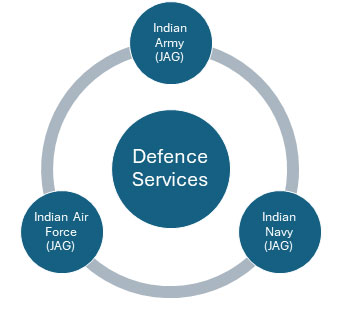
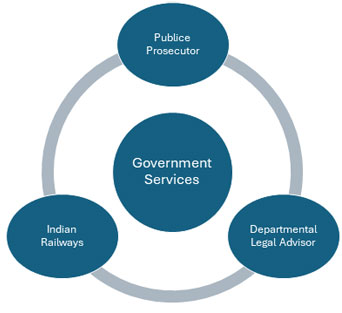
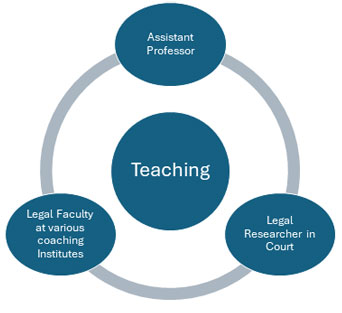
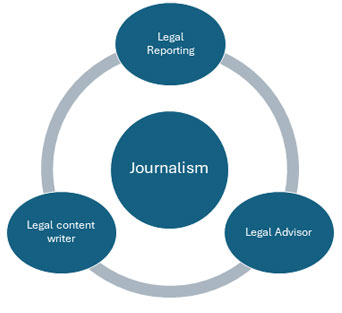

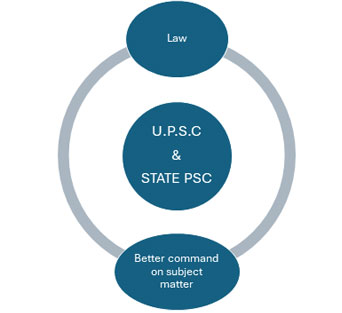
Law Education after High School:
Integrated LLB: It is primarily a 5-year integrated course in Law. It is in combination with either Arts, science, commerce or management Stream with. LLB, on the other hand, is a 3-year simple Bachelor of Laws program which you can pursue after you have completed your graduation in the field of study you prefer.
|
Course |
BA LLB |
BSc LLB |
BCom LLB |
BBA LLB |
|
Duration |
5 Year |
5 Year |
5 Year |
5 Year |
|
Duration |
Arts Stream |
Science Stream |
Commerce Stream |
Management Stream |
Benefits of Studying Integrated Law Program
- The 5-year-integrated model envisages integration of two primary streams, one being law and the other stream could be Arts, Management, Science or Commerce
- interdisciplinary course curriculum and development of diverse future-ready competencies
- Saving of one crucial year of the aspirant, Since LLB (3 years program) done after graduation (3 years degree), consumes a total of 6 years to get law degree, as compared to 5 years in case of an integrated law degree program after your 12th standard.
You could study law after 12th by taking admission in the 5year integrated Law programs, viz, BA LL.B, BBA LL.B and B. Com LL.B. Admission to these under-graduate law courses is generally made on the basis of entrance exams such as national-level Common Law Admission Test (CLAT), or, other university/college specific entrance test/criteria, in addition to recognizing CLAT scores for admission purposes
The affiliated law colleges which sign the Memorandum of Agreement (MoU) offer admission to UG and PG courses based on CLAT scores.
Check out the table below to know the list of affiliated colleges with CLAT:
|
Nirma University |
Ahmedabad |
|
UPES Dehradun |
Dehradun |
|
Bennet University |
Delhi |
|
Alliance School of Law |
Bangalore, Karnataka |
|
Amity University |
Noida, Uttar |
|
Asian Law College |
Noida, Uttar |
|
Delhi Institute of Rural Development |
Holambi, Delhi |
|
(D.I.R.D.) |
Bengaluru, Karnataka |
|
Geeta Institute of Law |
Panipat, Haryana |
|
Disha Law College |
Raipur, Chhattisgarh |
|
Galgotias University |
Greater Noida, Uttar Pradesh |
|
IFIM Law College |
Bengaluru, Karnataka |
|
Harlal Law School |
Greater Noida, Uttar Pradesh |
|
Indore Institute of Law |
Indore, Madhya Pradesh |
|
JECRC University |
Jaipur, Rajasthan |
|
Jagannath University |
Jaipur, Rajasthan |
|
JIMS Engineering Management Technical Campus of Law |
Greater Noida, Uttar Pradesh |
|
Maharaja Surajmal Brij University |
Bharatpur, Rajasthan |
|
Manipal University |
Jaipur, Rajasthan |
|
Lloyd Law College |
Greater Noida Uttar Pradesh |
|
Maharashtra National Law University |
Aurangabad, Maharashtra |
|
SRM University, Haryana |
Gurugram, Haryana |
|
Siddhartha Law College |
Dehradun, Uttarakhand |
|
School of Law, The Northcap University |
Gurugram, Haryana |
|
Dr K.N. Modi University |
Rajasthan |
|
Vivekananda Global University |
Jaipur, Rajasthan |
|
Faculty of Law, Marwadi University |
Rajkot, Gujarat |
|
United World School of Law, Karnavati University |
Gandhinagar, Gajarat |
|
Reva University |
Karnataka |
|
Maharishi University of Information |
Delhi NCR |
|
Technology |
Dehradun, |
|
Law College Dehradun, Uttaranchal |
Uttarakhand |
About CLAT
Major Competitive Examination in India
|
Common Law Admission Test (CLAT) |
CLAT is an all India entrance examination conducted on rotation by 26 national law universities (NLUs) for admissions to their undergraduate and post graduate degree programs (LL.B & LL.M) |
|
All India Law Entrance Test (AILET) |
AILET - All India Law Entrance Test is an exam conducted exclusively for National Law University (NLU) Delhi BA-LLB, LLM, Ph.D. Admissions |
About CLAT
|
FEATURES |
DETAILS |
|
Exam name |
Common Law Admission Test (CLAT) |
|
Conducting body |
Consortium of NLUs (aka the CLAT Consortium) |
|
Exam frequency |
Once a Year |
|
Exam mode |
Pen and Paper exam |
|
Exam duration |
2 hours |
|
Accepting colleges |
There are 26 members NLUs of the consortium that accepts CLAT scores for admission to 5-year LLB and LLM courses In addition, there are 61 affiliates, which are private universities that have signed MOUs with the consortium to use CLAT scores. |
Subjects and Exam Pattern
|
SUBJECTS |
NO. OF QUESTIONS |
MARKS ALLTED |
|
English including Comprehension |
22-26 | 20% |
|
General Knowledge and Current Affairs |
28-32 | 25% |
|
Legal Reasoning |
28-32 | 25% |
|
Logical Reasoning |
22-26 | 20% |
|
Quantitative Techniques |
10-14 | 10% |
Total Questions: 120
1 Marks -each question.
Each wrong answer carries -0.25 marks
CLAT Exam Pattern
Passage-based questions - The question paper, not including the Quantitative Techniques section, will have passages of 300-400 words each. Questions will be asked from these passages.
Quantitative section: Instead of passages, this section will have questions based on "short sets of facts or propositions, graphs, or other textual, pictorial, or diagrammatic representations of numerical information."
Standard of questions: The undergraduate exam will be of standard.
Skills tested - The paper will test the candidate on several parameters, including their ability to read, think critically, and do analytical thinking.
The total number of questions and marking scheme - CLAT UG will have 120 objective-type questions. Each question will be of one mark, while for an incorrect answer, 0.25 marks will be deducted
Comparison of major Examinations:
of two primary streams, one being law and the other stream could be Arts, Management, Science or Commerce interdisciplinary course curriculum and development of diverse future-ready competencies
Saving of one crucial year of the aspirant, Since LLB (3 years program) done after graduation (3 years degree), consumes total 6 years.
|
EXAM |
CLAT |
AILET |
|
Duration |
2 Hours (120 Minutes) |
2 Hours (120 Minutes) |
|
Mode of Exam |
Paper Pen Mode |
Paper Pen Mode |
|
Level of Entrance |
UG & PG |
UG & PG |
|
No. Of Questions |
CLAT UG -120 Questions |
150 Questions |
COLLEGES & THEIR SEAT MATRIX:

REGSITERATION LINK FOR CLAT:
CLAT COACHING MODULE
Coaching Module: Advantage AICE
Over a decade of realizing dreams
Amity Institute for Competitive Examinations (AICE) has over the years established itself as one of India's premier institutes offering advanced study support through its years of expertise in education delivery and preparing students
for various competitive exams. We are proud to share that now you can get the benefit of AICE expertise in preparing for Law Entrance examinations too like CLAT and AILET, thus taking forward the legacy of successfully delivering of stupendous results in Engineering, Medical, Olympiads, CAT, SAT and other entrance examinations. Diversifying its vision and objectives requirements, the institute primarily aims at enhancing the knowledge base of students by developing their analytical skills, reasoning and logical acumen, thus giving them a winning edge over others.
CLAT: Program Features
|
Features |
Crack CLAT 1 Year Regular |
Master CLAT 2 Year Regular Course |
|
Target CLAT Year |
Target CLAT this year |
Target CLAT next year |
|
Suitable for students |
Student entering 12th class |
Student entering 11th class |
|
Classroom Study Hours (Total) |
300 |
420 |
|
Topic Test |
6 |
76 |
|
Module Test & Discussion |
40 |
71 |
|
Doubt/Revision Sessions |
45 |
66 |
|
Mock Test( Nos.) + Discussions ( |
30 |
50 |
|
hours ) |
||
|
Total Dedicated Hours |
506 |
733 |
|
Class schedule |
Weekdays/Weekend Classes |
Weekdays/Weekend Classes |
|
Classes Mode |
Hybrid Mode |
Hybrid Mode |
|
Batch Starting From |
February |
May-June |
SALIENT FEATURES OF THE PROGRAMMES
THE GURU MANTRA FOR STUDENTS
"Work smart, not just hard!"
Be smart, carefully workout weightage for different topics (note: all topics do not carry equal weightage). Realizing this and evolving a strategy that will help ensure high scores.
Distinguished Faculty at AICE: The head of each department is a senior member of the academic world with core expertise and decades of experience in the respective fields
Unique teaching methodology: At AICE, our aim is to maximize the potential of an average student through comprehensive training for exam-oriented course curriculum. The unique learning methodology coupled with a practical competitive exam-based skill building strategy makes learning interesting at AICE.
Counselling by Experts: Expert counselling sessions are arranged to help students make the most crucial decisions of their lives. The expert counselling sessions are
addressed by the senior members of the academic world with core expertise and decades of experience in their respective fields.
Comprehensive study material: It is prepared by a team of highly educated, experienced & dedicated academicians with proven track record & ability. The subject matter is precise, crisp & clear. The entire material is specially designed by our experts and faculties at AICE to develop an in-depth understanding of the subjects.
Individual attention: Students are given sufficient individual time to interact freely with the faculty. Every problem by the students is systematically explained till they are satisfied. No room for confusion is left as the queries are promptly answered.
Doubt clearing sessions: Each test is followed by a discussion, which includes a doubt clearing & technique imparting session. The student is facilitated by teachers for individual interaction related to clearing of the doubts.
Comprehensive worksheets: Additional questions given to the students are in the form of worksheets, based on the topics covered in the classes. The worksheets are provided more effectively on a regular basis to help students grasp the concepts.
Regular Parents Interaction: AICE understands the value of the parents' interaction with the teaching faculty and management. We at AICE keep in mind that Parents are regularly updated about the progress of their child and keep organizing interactive sessions not only with the child but also with the parents at regular intervals.
Copyright © 2021 AICE CLAT coaching program